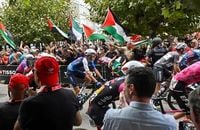The Vuelta a España, one of cycling’s grand tours, has become the latest arena for international tensions as pro-Palestinian protests have repeatedly disrupted the race and ignited a fierce debate over the participation of the Israel–Premier Tech team. The controversy reached a boiling point this week when Spain’s foreign minister, Jose Manuel Albares, publicly voiced his support for the expulsion of the Israeli squad, although he emphasized that the final decision lies with cycling’s governing body, the Union Cycliste Internationale (UCI).
The drama unfolded most dramatically during stage 11 in Bilbao on September 4, 2025. As the peloton neared the finish, demonstrators waving Palestinian flags and carrying protest signs surged against temporary barriers, prompting police and security to intervene. The organizers, faced with mounting safety concerns, made the unprecedented call to cancel the stage just 10 kilometers from the end. No winner was declared, and the incident sent shockwaves through the cycling world.
“The management and especially the riders are afraid. They are exposed on their bikes and we don’t know what might happen,” said Eric Van Lancker, one of Israel–Premier Tech’s sporting directors, reflecting the anxiety gripping the team. Oscar Guerrero, another sporting director, added, “We are afraid. We are being subjected to insults and all kinds of verbal attacks, it’s hard,” during an interview with Onda Cero radio. The team has since ramped up its security measures, even advising riders not to wear jerseys emblazoned with ‘Israel’ during training to avoid being targeted.
These protests are not isolated incidents. Earlier in the race, demonstrators blocked the Israeli team’s participation in the stage 5 time trial in Figueres. Italian rider Simone Petilli, from the Intermarché–Circus–Wanty team, crashed on September 2 after encountering a protest, further underscoring the risks riders face amid the unrest.
The political dimension of the controversy is impossible to ignore. Spain’s left-wing government, which formally recognized the State of Palestine in May 2024 alongside Ireland and Norway, has been a vocal critic of Israeli policy in Gaza and the West Bank. In May 2025, Madrid called for international sanctions and embargoes against Israel, citing what it described as a genocide in Gaza, where at least 64,300 Palestinians have been killed. Arms export licenses to Israel have been suspended since November 2023 due to concerns over potential violations of international humanitarian law.
Foreign Minister Albares, speaking on Radio Nacional de España, made his position clear: “We have to send a message to Israel and the Israeli society that Europe and Israel can only have normal relations when human rights are respected.” However, he was quick to clarify that the Spanish government does not possess the authority to remove a team from the Vuelta. “I would understand and be in favor” of expelling Israel–Premier Tech, Albares said, “but the decision ultimately rests with the UCI.”
The UCI, for its part, condemned the disruptive protests but firmly rejected calls to use cycling as a form of political punishment. In a statement, the governing body declared, “Cycling in particular, has a role to play in bringing people together and overcoming barriers between them, and should under no circumstances be used as a tool for punishment.” The UCI declined to comment further on Albares’s remarks when contacted by the Associated Press.
Vuelta technical director Kiko Garcia has also weighed in, suggesting that Israel–Premier Tech should consider withdrawing voluntarily or that the UCI should intervene to prevent further disruptions. “At some point someone will have to decide if we protect an international event like the Vuelta, or if we protect a team,” Garcia said. He added, “I hope the Israeli team realizes that by being here it doesn’t help the safety of everyone else.”
Despite the mounting pressure, Israel–Premier Tech has stood its ground. The team issued a statement explaining its refusal to withdraw: “Any other course of action sets a dangerous precedent in the sport of cycling — not only for Israel Premier Tech, but for all teams.” The sentiment was echoed by Prime Minister Benjamin Netanyahu, who sent a message of encouragement to the team: “Great job to Sylvan [Adams] and Israel’s cycling team for not giving in to hate and intimidation. You make Israel proud!”
Race organizers have found themselves caught between upholding the right to peaceful protest and ensuring the safety of participants. In an official statement following the Bilbao disruption, they said, “La Vuelta respects and defends the right to peaceful demonstration within the context of the event, but cannot tolerate any acts that put at risk the physical safety of the participants or any member of the race caravan.” The delicate balancing act has only intensified calls for a resolution as the race continues under heightened security and scrutiny.
The Vuelta’s challenges mirror a broader shift in Spanish policy and public sentiment regarding the Israeli–Palestinian conflict. The left-wing party Izquierda Unida has publicly urged the race organizers to exclude Israel–Premier Tech, citing Israel’s actions in Gaza as grounds for disqualification. Meanwhile, Spain’s government has pushed the European Union to reconsider its association agreement with Israel, arguing that continued relations undermine the EU’s credibility on human rights.
The controversy has even spilled into other sports. In the same week as the cycling protests, a Spanish chess tournament initially informed Israeli players that they would not be allowed to compete under their national flag. After a backlash and intervention from the global chess federation FIDE, the decision was reversed, and the Israeli flag was reinstated for the tournament. FIDE issued a statement condemning any form of discrimination, “including on the basis of nationality and flag,” and reiterated that “the same rules apply to Israel and its players as to all other member federations that are not under any form of sanctions.”
As the Vuelta a España presses on, the intersection of sport and politics has never been more visible. Riders, organizers, and fans are left grappling with questions that transcend the race itself: How should global sporting events respond to political crises? Where does the line lie between protest and disruption? And, perhaps most urgently, what does the future hold for Israeli athletes competing on the international stage?
For now, the Vuelta remains in the spotlight, its outcome overshadowed by the broader debate swirling around it. As the race continues, so too does the scrutiny, with all eyes on the UCI and the organizers to see how they will navigate this unprecedented challenge. One thing’s for certain: the 2025 edition of the Vuelta a España will be remembered for far more than just the action on the road.



